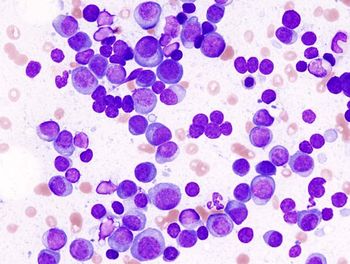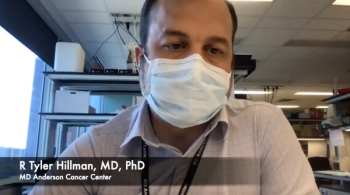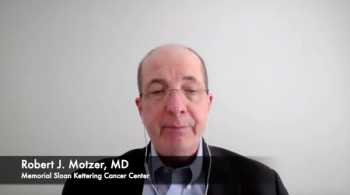
During the 2021 ASCO Annual Meeting, Suresh S. Ramalingam, MD, looked forward to how trials regarding adjuvant therapy for early-stage non–small cell lung cancer are poised to change the treatment paradigm in this setting.

Your AI-Trained Oncology Knowledge Connection!


During the 2021 ASCO Annual Meeting, Suresh S. Ramalingam, MD, looked forward to how trials regarding adjuvant therapy for early-stage non–small cell lung cancer are poised to change the treatment paradigm in this setting.

Here are some of the important updates from last week you might have missed, including data from the 2021 ASCO Annual Meeting.

Differences in frequency of germline pathogenic variants were not seen in patient subsets by ethnicity when comparing 12 genes linked with breast cancer.

Data presented from the phase 3 SIMPLIFY 1 and SIMPLIFY 2 trials at 2021 EHA indicate success of momelotinib in extending overall survival in patients with myelofibrosis who achieve transfusion independence.

Neal D. Shore, MD, FACS, discusses the importance of multidisciplinary care for patients with advanced prostate cancer.

Petros Grivas, MD, PhD, regarding updates in genitourinary oncology that were read out at the meeting.

A trial of an eprenetapopt combination has met the prespecified primary efficacy end point in patients with acute myeloid leukemia harboring TP53 mutations.

At the 18-month follow-up, the CAR T-cell therapy led to early, deep, and durable responses with a manageable safety profile in patients with relapsed/refractory multiple myeloma.

This special edition of the “Oncology Peer Review On-The-Go” podcast details treatment options and considerations for relapsed/refractory follicular lymphoma.

An expert emphasizes how a big team is needed to properly employ the different therapeutic modalities needed to treat patients with ovarian granulosa cell tumors.

The new data may put to rest concerns that adding perioperative systemic therapy might worsen outcomes in patients slated for cytoreductive surgery and hyperthermic intraperitoneal chemotherapy.

Results of the phase 1 portion of ZUMA-4 support continued investigation into the efficacy of KTE-X19 in pediatric patients with B-cell acute lymphoblastic leukemia.

Petros Grivas, MD, PhD, discusses the impact of avelumab on patients with advanced urothelial carcinoma in the first-line maintenance setting.

The anti–PD-1 antibody is being assessed as therapy for patients with recurrent or metastatic cervical cancer after positive results indicate improved responses with the monotherapy.

Radioligand therapy 177Lu-PSMA-617 receives breakthrough designation from the FDA based on better overall survival outcomes in patients with metastatic castration-resistant prostate cancer.

Patients who received breast-conserving surgery followed by radiotherapy demonstrated superior outcomes compared with patients who received mastectomy, regardless of radiotherapy status.

Motzer discussed time to deterioration end points for patients with advanced renal cell carcinoma treated with pembrolizumab and lenvatinib in the first-line setting.

Avapritinib is now fully approved to treated advanced systemic mastocytosis, according to phase 1 and phase 2 clinical trial data.

Usmani noted the strong overall response and stringent complete response rates observed with ciltacabtagene autoleucel for multiple myeloma at a median follow-up of 18 months.

Real-world data regarding the use of tisagenlecleucel and axicabtagene ciloleucel CAR T-cell therapy are reported at 2021 EHA.

Patients who had resection within 12 weeks of diagnosis of stage I NSCLC were found to have lower rates of recurrence.

An end-of-study analysis of the LYRA trial found that patients with treatment-naïve and relapsed multiple myeloma achieved durable responses to daratumumab plus CyBorD induction followed by daratumumab maintenance therapy.

Agha detailed updated findings from CARTITUDE-2 investigating cilta-cel for previously treated patients with multiple myeloma.

CAR T-cell therapy with axicabtagene ciloleucel (axi-cel; Yescarta) showed promise in patients with high-risk relapsed/refractory indolent non-Hodgkin lymphoma.

Bemcentinib plus PD-1/L1 inhibition moves forward as therapy for patients with AXL-expressing non–small cell lung cancer.

Real-world evidence evaluating the efficacy of rituximab maintenance following frontline BR or R-CHOP supports its use in mantle cell lymphoma.

Jabbour detailed the importance of managing care in a multidisciplinary setting for patients enrolled in the KEYNOTE-799 trial with stage III NSCLC.

Look at some of the important updates from last week you might have missed from the 2021 ASCO Annual Meeting and the FDA.

Close monitoring for neurologic toxicity resulted in no long-term effects in a patient cohort treated with ciltacabtagene autoleucel for relapsed/refractory multiple myeloma.

Retrospective data presented at 2021 EHA revealed potential treatment gaps in the management of patients with myeloproliferative neoplasms.